Deposing the Pope? An invitation to read
Introduction
Some authors, faced with the “Bergoglio case,” especially since the Apostolic Exhortation Amoris laetitia (March 19, 2016), have collected signatures, launched petitions to have Pope Francis deposed and another pope appointed.
These people raised the question of whether they could depose the Pope who objectively fell into material heresy. Most answered in the negative, appealing to the axiom ‘Prima Sedes a nomine judicetur’. Only a few authors insistently proposed the option of deposing Pope Bergoglio to appoint another in his place, but with little success or follow-through.
Radio Spada Editions published the book Deposing the Pope? by Fr. Curzio Nitoglia, regarding this pungent problem.
This book can help the reader form an idea about what the best Catholic theologians say about the hypothesis of the Pope being heretical and possibly to be deposed. In fact, these pages collect what theologians, Church Fathers and Scholastic Doctors (up to Father Reginaldo Garrigou-Lagrange) have written regarding the possible hypothetical material heresy of a Pope and his possible deposition by the Episcopate or the College of Cardinals.
The book may come in handy so that the reader can study-with some ease and without having to do complicated and difficult research-the doctrine expounded by the theologians, but without any claim or desire to “define” or “compel belief.”
Be the First See not judged by anyone
The Pope cannot be judged by any human or ecclesiastical authority (Emperor, Episcopate, College of Cardinals) with a judgment of canonical/legal value, as if he were a subject of it, for the Pope’s only superior is Jesus Christ, whose immediate and proximate Vicar the Pope is, and, therefore, the Roman Pontiff has no man (lay or even ecclesiastical) above himself outside of Jesus, who if he is true man is also true God.
For while the hypothetical lack of Faith would separate a Pope who has fallen into error against the Faith from the body of the Church, and the lack of sanctifying grace would separate him from the soul of it; Jurisdiction, on the other hand, would not be affected since it pertains to the government of the Church, which is a visible Society and cannot be deprived of the authority that governs it for the lack of grace or faith, which are supernatural, spiritual and invisible garments, while the government or Jurisdiction of a visible Society must be visible. So, the hypothetically heretical Pope would not be a living member of the Church for lack of grace, he would not be part of the body of the Church for his hypothetical error against the Faith, but he would still be its visible head as far as government or Jurisdiction is concerned.
The Authority of an acting Pope is essential to the Church
Authority is the essence of every temporal and spiritual Society and, therefore, also of the Church, which is a perfect Society of spiritual order, so that the Pope in act (and not a virtual Pope) is not accidental, but essential and necessary to the subsistence of it. Without a Pope in act, the Mystical Body would be similar to a body without form or soul, that is, dead. Since Authority is the principle of unity and being of the Society, it would no longer be one nor would it exist without Authority. Thus, the Pope is not accidental, but essential to the subsistence of the Church (cf. St. Thomas Aquinas, C. Gent., IV, c. 76). Without an Acting Ruling Pope, the Mystical Body would not subsist. The virtual Papacy, the virtual Church are not compatible with the divine Institution of the Church founded by Christ on the physical and really actual person of Peter (and so for his successors: the Popes, until the end of the world).
It is permissible to inform the Pontiff of his possible errors
However, it is permissible to bring a logical judgment (subject, object complement, and predicate) about the Pope’s acts; e.g., “Pius XII (subject) defined (verbal predicate) the Assumption of Mary into Heaven (object complement)”; it is likewise permissible to bring a logical judgment about pastoral or exhortative acts, but not dogmatically defining and obligatory, e.g: “Pope Francis (subject) has exhortatively taught (verbal predicate) that even public sinners, who wish to persist in the state of grave sin, can receive the Sacraments of the living (object complement)”; or: “John Paul II, following the pastoral of the Second Vatican Council, taught that the Old Covenant was never revoked.” These, in fact, are only purely logical judgments, analogous to “heaven (subject) is (verbal predicate) blue (object complement),” in short, they are a statement of a fact and “against the fact does not count as an argument” and are not a legal/judicial/criminal judgment with canonical value.
The First Vatican Council (DB, 1831) solemnly defined the doctrine of the Primacy of the Pope, who has over the flock of Christ a full, supreme, universal, immediate and ordinary jurisdictional or governing authority over both Faith and Constitutions and discipline.
The Episcopate is, not only not superior to the Pope, but neither is it equal to him. The errors of Conciliarism and Gallicanism, which teach the superiority of the Council over the Pope and that the bishops’ jurisdiction derives directly from God and not through the Pope, were condemned by the Church (cf. DB, 1322 and 1589) and received the coup de grace with Vatican I. The Church was founded on Peter as the primary and fundamental rock and the Pope as Peter’s successor is essential to it; the Episcopate likewise is of divine institution, but subordinate to the Papacy. All power descends from God directly to the Pope and from him to the Bishops.
Conclusion
Professor Cyrille Dounot in his book La déposition du Pape hérétique (Paris, Mare & Martin, 2019), in chapter 7, Paul VI hérétique? La deposition du Pape dans le discours traditionaliste (p.164), concludes as follows:
“After reading the writings of the Authors in favor of the deposition of the Pope deemed heretical, one notes a final failure. Whatever path is taken to arrive at the solution of the problem, none of them is practically feasible. The only viable path seems to be that of supernatural vision, in which the souls of the faithful await the intervention of divine Omnipotence. Pope Paul VI’s deposition theory during his pontificate (the closing of the Second Vatican Council in 1965 and the promulgation of the New Mass in 1969), has shown its limitations and its practical inability to reach a solution. It remains a very difficult hypothesis to put into practice. […]. It is understood that humanly the situation is inextricable. One must wait for divine Providence, in one way or another, to show the way out of the impasse.”
Why has it come to this?
According to a theologian of the 1950s, Fr. Pacifico Massi, a kind of instinct of preservation would be at the origin of the concern to safeguard the Church from possible deviations of a Roman Pontiff:
“The doctrines opposed to the Pontifical Primacy originated from the instinct of preservation, operating also in the body of the Church as in every living entity, against the possibility of an unworthy Pope, who would lead the Church to ruin. Juan de Torquemada also felt this instinct, but he knew how to preserve a healthy equilibrium that did not allow him to recede from the right principles, nor did it allow him to remain silent in the face of any past or hypothetically future errors of the Popes in a passive and guilty acquiescence. “
False solutions
Today some solutions are being proposed again in the face of the disastrous situation in the ecclesial environment especially during the Pontificate of Francis. In fact while one should
- a) Maintain a healthy balance, without denying the principles of the Faith and furthermore
- b) Not remain silent in the face of any errors against the Faith and the Constitutions of superiors – unfortunately in our days:
-
- There are those who re-propose the conciliarist theory and would like to have the Pope, as a heretic, deposed from the Episcopate.
- Those who assert that one must accept the Decrees of the Second Vatican Council obligatorily even if they are merely pastoral, as well as the purely “exhortative” teaching of Francis (cf. Exhortation Amoris laetitia, March 19, 2016);
- Finally, there are also those who affirm the true Catholic Doctrine, avoiding the two errors by excess (Servility) and by defect (Conciliarism/end Apostolicity) as the two ravines, which stand to the right and left of the summit of a mountain on which the true solution is found “in medio et in culmine altitudinis et non mediocritatis / in the right middle of height and not of mediocrity” (R. Garrigou-Lagrange, De Revelatione, Rome, Ferrari, 1918).
Endurance, then, is not the only remedy. In fact, St. Thomas Aquinas teaches that the bad prelate can be corrected-privately and doctorally, but not authoritatively and judicially-by the inferior having recourse to the superior denouncing him, and if he has no human superior (as in the case of the pope), let him have recourse to God to correct him or remove him from the face of the earth” (IV Sent., dist. 19, q. 2, a. 2, qcl. 3, ad 2).
Certainly, it is necessary to avoid the error (through excessive indiscreet “obedience”) that leads to the flattening or Servility of the faithful, Bishops and Cardinals to a Pope, who exceeds his powers, which are limited by divine Law and Revelation. The Prophet calls them “dumb dogs incapable of barking” (Is., LVI, 10). In this case it is licit and proper to admonish the Pope of the error or abuse of power he is making and bark such as Domini canes (as St. Paul did with St. Peter in Antioch, Gal., II, 11-14; Acts., XV, 13-215) and face the sad reality without burying one’s head in the sand as the ostrich does or judging the Pope authoritatively and jurisdictionally, which would be tantamount to practically denying the Pope’s Primacy of Jurisdiction and would therefore be at least materially heretical.
As Gaetano wrote (Apologia de comparata auctoritate Papae et Concilii, Rome, Angelicum ed. Pollet, 1936, p. 112 ff.), citing Angelicus De regimine principum (lib. I, ch. V-VI), the remedy for an evil as great as “a wicked Pope” is prayer and recourse to the Almighty divine assistance over Peter, which Jesus solemnly promised. In fact, the Common Doctor teaches that normally those most likely to revolt against the temporal tyrant are the “rascals,” while judicious people manage to be patient as long as it is possible and only as a last resort do they resort to “revolt” against the temporal tyrant. Thus, Cajetanus, concludes that if one must have a lot of patience with the temporal tyrant and only exceptionally can one resort to armed revolt and tyrannicide, in the case of the unworthy pope or “spiritual criminal” (V. Mondello, The Doctrine of Gaetano on the Roman Pontiff, Messina, Arti Grafiche di Sicilia, 1965, p. 65) not only is “papicide” and armed revolt never licit, but neither is his deposition by the Council, which is inferior to the Roman Pontiff and therefore cannot juridically inquire and depose him. So, one must be invited to pray for the “dastardly Pontiff” that God will open his eyes or “close” them. Hence it is permissible to recite the Oremus “pro Pontifice nostro Francisco…,” such as naming him to the Canon of the Mass so that God will provide for his person in the way He deems best (it is not for us to suggest to God which it is), without invalidating the Mass or falling into the sin of “Heresy and Capital Schism.”
Regarding the duty not to obey illicit orders, even if they were given by the pope, again Valerio Gigliotti in the book edited by Cyrille Dounot, La déposition du Pape hérétique, (Paris, Mare & Martin, 2019) in the 2nd chapter, La chute du Pape: entre renonciation et déposition, writes (p. 63) that Cardinal Hostiensis Henry of Susa in the Summa Aurea (lib. III, ch. 8, par. 4), in the 13th century, following St. Thomas Aquinas, “admits the possibility of publicly retaking the Pope, under certain well-defined conditions, while strongly reaffirming the inescapable principle, Prima Sedes a nemine judicatur.” It is, in short, a fraternal, professorial, doctrinal correction or admonition (like St. Paul’s to St. Peter at Antioch), but not a criminal, jurisdictional and juridical judgment brought on the Pope who has no human superiors, so, Gigliotti concludes:
“One can only pray to God for the Pope who errs in the faith and ask the Heavenly or triumphant Church to intercede for him, since neither the Emperor, nor the Clergy (Episcopate/Cardinalate and Priesthood), nor the faithful have the superior power over the Pope so as to be able to judge him canonically. Therefore, the Pope’s soul is only in his own hands, and should he persist in error without being able to be judged canonically and deposed by any human authority, and should he die in this state he would fall under the severe judgment of God, who alone can criminally judge the Pope being superior to him” (V. Gigliotti, cit., p. 64).
However, the state in which the Catholic Hierarchy finds itself today does not bode well. The evil produced by Vatican II is so profound, universal and infirmly preternatural that only God with His Omnipotence can remedy it, “Abissus abissum invocat.”
In this hour of agony of the ecclesial environment – produced by diabolical action, which has made use of Judaism/Masonry as its main instrument, as when Jesus in Gethsemane, on Holy Thursday, said to the Jews who had come to take Him, “This is your hour [of Rabbinic/Talmudic Judaism, ed.] and of the power of darkness [the infernal forces, ed, XXII, 53)-which will invariably be followed by His glorious and triumphant Resurrection (as happened after the Passion and Death of Jesus, of which the Church is the continuation in history) it is necessary to 1) maintain the Doctrine always taught by the Church and 2) avoid errors a) by default (Conciliarism/end of the Apostolicity of the Church of Christ), which diminish the authority of the Papal Primacy; b) by excess (Servility), which deem the Pope always infallible even when he renounces the infallible assistance of the Holy Spirit, not dogmatically defining and not obliging belief for the salvation of the soul (as was the case in the pastoral Vatican Council II); finally 3°) today we must above all continue to do what the Church has always done (St. Vincent of Lerino, Commonitorium, III, 15) avoiding swerving “to the right” or “to the left”.
Pietro Palinuri
Source: Don Curzio Nitoglia

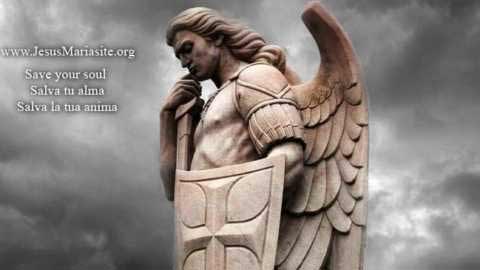
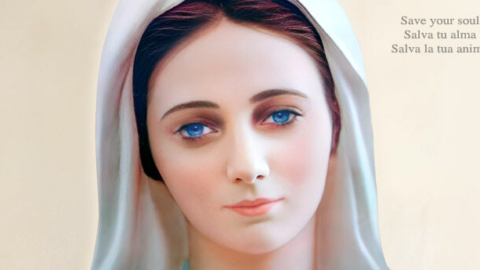





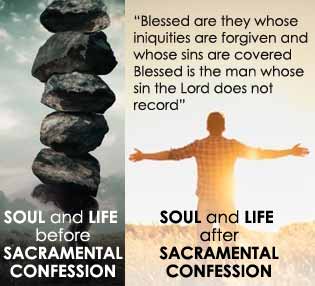








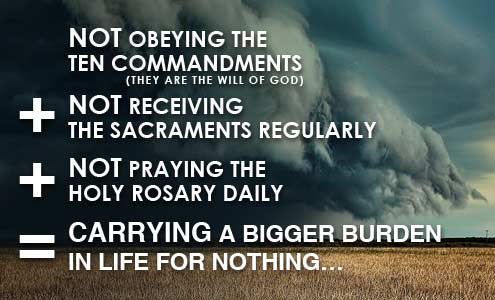
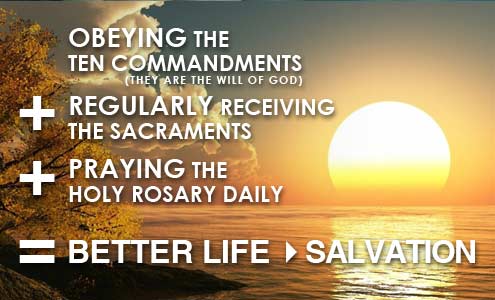

 Pray for the Church, its Hierarchies, the validly ordained and consecrated during this time of confusion and apostasy. Do not fall into the trap of division, even with apparent good reasons. Turn your eyes to the lives of saints, such as St. Martin de Porres, St. Padre Pio of Pietrelcina, the former discriminated against and the latter fought by the same institution. Let their behavior in adversity be an example for you to follow…
Pray for the Church, its Hierarchies, the validly ordained and consecrated during this time of confusion and apostasy. Do not fall into the trap of division, even with apparent good reasons. Turn your eyes to the lives of saints, such as St. Martin de Porres, St. Padre Pio of Pietrelcina, the former discriminated against and the latter fought by the same institution. Let their behavior in adversity be an example for you to follow…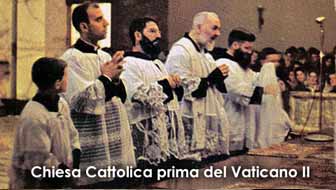
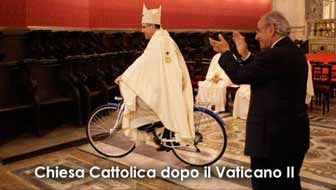
 “The Church is God’s house. It is forbidden for men to enter here with bare arms and wearing shorts. It is forbidden for women to enter wearing trousers, bare headed, with short, low-necked or sleeveless dresses.”
“The Church is God’s house. It is forbidden for men to enter here with bare arms and wearing shorts. It is forbidden for women to enter wearing trousers, bare headed, with short, low-necked or sleeveless dresses.”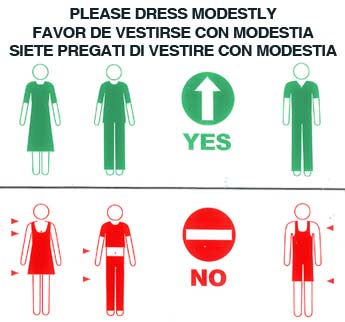
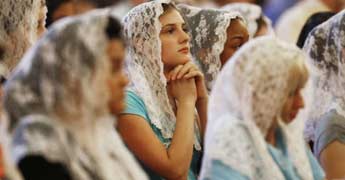
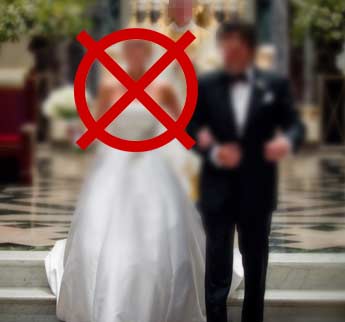
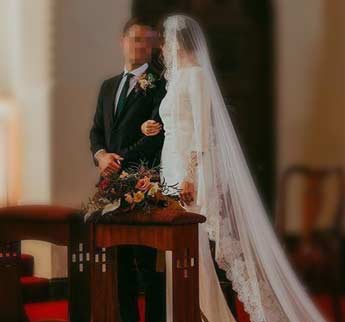
 “Parents, correct the ways if your family, have much dialogue with your children, make time to listen to them as many homes are being lost due to lack of love, dialogue, understanding and most specially for not inviting God. Take God back into your homes, pray my Holy Rosary, as the family that prays together stays together.”
“Parents, correct the ways if your family, have much dialogue with your children, make time to listen to them as many homes are being lost due to lack of love, dialogue, understanding and most specially for not inviting God. Take God back into your homes, pray my Holy Rosary, as the family that prays together stays together.” 



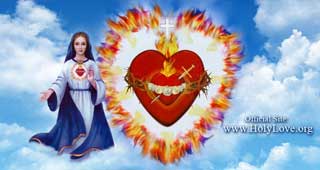
 January 31, 2022 "Heavenly Father, today, I surrender to You my heart. Help me to be Your instrument in the world. Cover me with the Precious Blood of Your Divine Son. Guard me against all evil. Protect me from any evil plan Satan may have for me today. Clothe me in Your Divine Will. Amen"
January 31, 2022 "Heavenly Father, today, I surrender to You my heart. Help me to be Your instrument in the world. Cover me with the Precious Blood of Your Divine Son. Guard me against all evil. Protect me from any evil plan Satan may have for me today. Clothe me in Your Divine Will. Amen"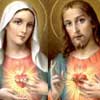 "O Hearts of Jesus and Mary; I consecrate myself, I consecrate my family and the whole world, to your Most Beloved Hearts. Listen to the supplication which I making to you and accept our hearts in Yours, to be delivered and protected we, the whole world, from all evil and all sin. May the protection of your Two Hearts be refuge, strength, and protection, in the daily spiritual struggles. That the power of your Two Hearts irradiates the world so that it is protected from evil and sin. We willingly consecrate ourselves and consecrate all mankind to your Hearts; sure and confident, for your Great Mercy, to obtain the victory over the forces of evil in this world, and the eternal Glory in the Kingdom of God. Amen"
"O Hearts of Jesus and Mary; I consecrate myself, I consecrate my family and the whole world, to your Most Beloved Hearts. Listen to the supplication which I making to you and accept our hearts in Yours, to be delivered and protected we, the whole world, from all evil and all sin. May the protection of your Two Hearts be refuge, strength, and protection, in the daily spiritual struggles. That the power of your Two Hearts irradiates the world so that it is protected from evil and sin. We willingly consecrate ourselves and consecrate all mankind to your Hearts; sure and confident, for your Great Mercy, to obtain the victory over the forces of evil in this world, and the eternal Glory in the Kingdom of God. Amen" "O Virgin of Carmel, may the power of your Holy Scapular take away from me the enemy of my soul; bless me, Mother of Carmel, and deliver me from all evil and danger in this world. I ask you O Mother, that in the hour of my death, your Holy Scapular frees me from the fury of the devil and in the eternity, of the eternal fire. Amen"
"O Virgin of Carmel, may the power of your Holy Scapular take away from me the enemy of my soul; bless me, Mother of Carmel, and deliver me from all evil and danger in this world. I ask you O Mother, that in the hour of my death, your Holy Scapular frees me from the fury of the devil and in the eternity, of the eternal fire. Amen" 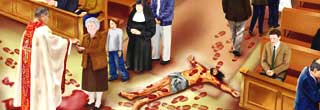
 "Oh Jesus of Divine Mercy, hear my pleadings to you, for I am here to do your Will"
"Oh Jesus of Divine Mercy, hear my pleadings to you, for I am here to do your Will" "O glorious St. Joseph! by your profound humility, by your unalterable meekness, by your invincible patience, by your angelic purity and perfect fidelity that made you a timely imitator of the virtues of Jesus and Mary, I ask you to console me in all my sorrows, to guide me in all my doubts, to defend me in all temptations, to deliver me from all spiritual and material dangers; to extend your arm against all my visible and invisible enemies, breaking and destroying all the snares and barriers that they tend and arm against me. Amen"
"O glorious St. Joseph! by your profound humility, by your unalterable meekness, by your invincible patience, by your angelic purity and perfect fidelity that made you a timely imitator of the virtues of Jesus and Mary, I ask you to console me in all my sorrows, to guide me in all my doubts, to defend me in all temptations, to deliver me from all spiritual and material dangers; to extend your arm against all my visible and invisible enemies, breaking and destroying all the snares and barriers that they tend and arm against me. Amen"  "Oh, blessed Saint Michael, protect us from the attacks and snares of the evil spirits because you know full well that we are poor mortals, fragile and weak, in need of the Mercy of God and of your protection to fulfill the mission that Heaven has commissioned to us. Oh, Saint Michael, may your victorious cry: “who is like God? no one is like God”, suppress and cast into Hell satan and all the evil spirits who prowl about the world seeking the destruction of souls. Amen"
"Oh, blessed Saint Michael, protect us from the attacks and snares of the evil spirits because you know full well that we are poor mortals, fragile and weak, in need of the Mercy of God and of your protection to fulfill the mission that Heaven has commissioned to us. Oh, Saint Michael, may your victorious cry: “who is like God? no one is like God”, suppress and cast into Hell satan and all the evil spirits who prowl about the world seeking the destruction of souls. Amen"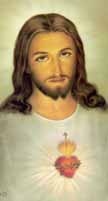 Most sweet Jesus, redeemer of the human race, look down upon us, humbly prostrate before your altar. We are yours and yours we wish to be; but to be more surely united with you, behold each one of us freely consecrates himself today to your most sacred heart. Many, indeed, have never known you, many too, despising your precepts, have rejected you. Have mercy on them all, most merciful Jesus, and draw them to your sacred heart. Be you king, O Lord, not only of the faithful who have never forsaken you, but also of the prodigal children who have abandoned you; grant that they may quickly return to their father’s house, lest they die of wretchedness and hunger. Be you king of those who are deceived by erroneous opinions, or whom discord keeps aloof, and call them back to the harbor of truth and unity of faith, so that soon there may be but one flock and one shepherd. Be you king also of all those who sit in the ancient superstition of the Gentiles, and refuse not you to deliver them out of darkness into the light and kingdom of God. Grant, O Lord, to your Church, assurance of freedom and immunity from harm; give peace and order to all nations, and make the earth resound from pole to pole with one cry: Praise to the divine heart that wrought our salvation; to it be glory and honor forever. Amen.
Most sweet Jesus, redeemer of the human race, look down upon us, humbly prostrate before your altar. We are yours and yours we wish to be; but to be more surely united with you, behold each one of us freely consecrates himself today to your most sacred heart. Many, indeed, have never known you, many too, despising your precepts, have rejected you. Have mercy on them all, most merciful Jesus, and draw them to your sacred heart. Be you king, O Lord, not only of the faithful who have never forsaken you, but also of the prodigal children who have abandoned you; grant that they may quickly return to their father’s house, lest they die of wretchedness and hunger. Be you king of those who are deceived by erroneous opinions, or whom discord keeps aloof, and call them back to the harbor of truth and unity of faith, so that soon there may be but one flock and one shepherd. Be you king also of all those who sit in the ancient superstition of the Gentiles, and refuse not you to deliver them out of darkness into the light and kingdom of God. Grant, O Lord, to your Church, assurance of freedom and immunity from harm; give peace and order to all nations, and make the earth resound from pole to pole with one cry: Praise to the divine heart that wrought our salvation; to it be glory and honor forever. Amen.